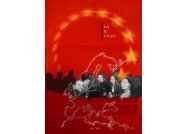turkish-greek civic dialogue - AEGEE Europe
turkish-greek civic dialogue - AEGEE Europe
turkish-greek civic dialogue - AEGEE Europe
Create successful ePaper yourself
Turn your PDF publications into a flip-book with our unique Google optimized e-Paper software.
- The obstacles on being objective and to what extent human beings<br />
be objective<br />
- The differences between recent Turkish and Greek Education<br />
systems<br />
- Learner-centered education: students defining their scope of<br />
education themselves, choosing what source to use what to learn<br />
and how to interpret<br />
- Civic history: people defining their own histories<br />
PROPOSALS FROM THE WORKSHOP PARTICIPANTS<br />
- Turks and Greeks writing history books together<br />
- Common perception of the Ottoman period, common Balkan<br />
textbook<br />
- Students and academics from the two countries being involved in<br />
exchange programs to help common understanding<br />
- Assistance from foreign experts in the formation of textbooks<br />
- Greek teachers coming to Turkey to see the educational process and<br />
the vice versa.<br />
- Training of teachers on both countries: teaching of ‘How to teach?’<br />
- More active NGOs concerning the history textbooks and raise<br />
consciousness on the effect of history books in formation of<br />
stereotypes<br />
- The usage of more than one source in history classes to enable<br />
learners to look at the issue from different perspectives.<br />
- Re-scanning of history books to eliminate the existing prejudices<br />
and negative attitudes towards the ‘Other’ nation (as in the project<br />
of Turkish History Foundation)<br />
“On the second day of the discussions, we had two presentations related to<br />
issue: Panagiotis Kontolemos analyzed the history textbooks in Greece since<br />
1980, dividing the time from 1980 to today into three periods due to the<br />
content and attitude of Greek history textbooks. The reason why he started<br />
analyzing the textbooks from 1980’s is that before 80’s there was a dictatorship<br />
in Greece and it would not be so efficient to compare the textbooks written in<br />
this period with the ones written in modern democratic Greece.”<br />
Association des Etats Généraux des Etudiants de L’<strong>Europe</strong><br />
ST period in Greek history textbooks starts in 1980 till 1987. First historical<br />
1 myth used in this period was the personification of the nation; that the<br />
whole nation is characterized as a single person for example ‘the Turk’. A<br />
second myth from third period is ‘We’ opposed to ‘the Others’- formation of<br />
an understanding and distinction of ‘we’ and ‘them’. There were the military,<br />
moral and cultural sections for this myth.<br />
An example from the military section: “Those were the ganisters, the worriers<br />
that scatter fear with their inhuman cruelty” (Diamandopoulou- Kiriazopoulou,<br />
Greek History of the Modern Times, 1986, sixth grade-primary school, page<br />
324).<br />
Another example is from the moral section “The Greeks, liberal people as they<br />
were, were never to be submitted nor doomed to the slave’s fate” (ibid 32).<br />
An example from the cultural section is as follows “In the dark period of the<br />
first years after the conquest, the rest of the nation appeared to be doomed<br />
in isolation by a culturally inferior ruler” (ibid 47).<br />
A third myth from this first period in Greek history textbooks is named as the<br />
‘Scapegoat’-to explain better, for all the unpleasant things happening, the<br />
‘Other’ nation was blamed. An example is “In its 400 years of slavery, Greece<br />
remained isolated, away from the civilized world” (ibid 183).<br />
As a general evaluation of the first period it can be said that there were highly<br />
nationalist attitudes in the textbooks, many stereotypes and comparisons on<br />
national scales, mentioning of only the victories.<br />
2<br />
ND period in Greek history textbooks starts with the Davos Agreement in<br />
1988, which also decided upon the content of Turkish and Greek textbooks.<br />
There were two main myths employed in this period as the ‘inferiority of the<br />
Other’ and the ‘superiority of the nation’. An example to the ‘inferiority of the<br />
Other is “He therefore had in front of him the country of ‘faithless people’<br />
something very ‘appetizing for the gazides adventurers that used to thicken<br />
the classes of the new nation” (ibid 297). An example for the superiority of<br />
the nation is “The most grievous fate of all is that of the unarmed Greeks<br />
of Asia Minor that had lived up there for more than 2,5 thousand years as<br />
the guards of a great civilization”. In this period the books were improving<br />
with the impact of Davos Agreement especially in higher levels of education.<br />
However still many books were considering the period under Ottoman rule as<br />
Rebuilding Communication<br />
59







